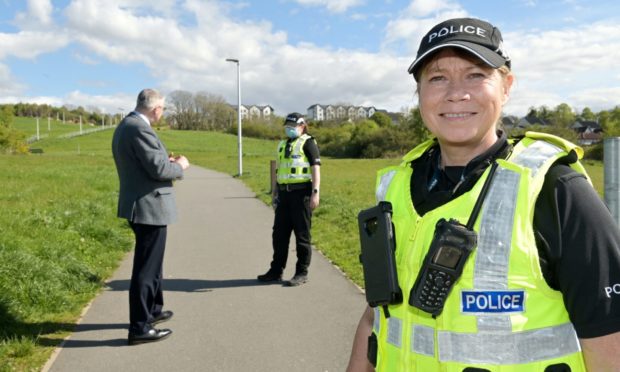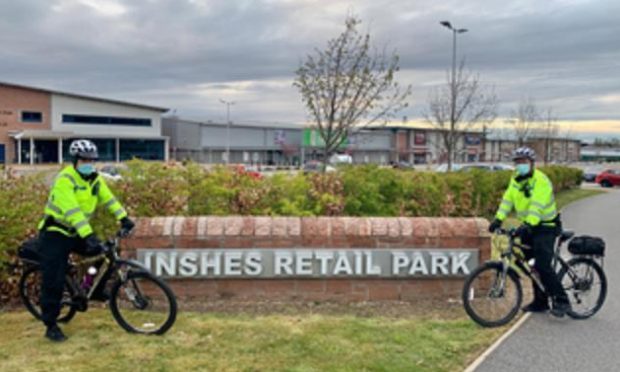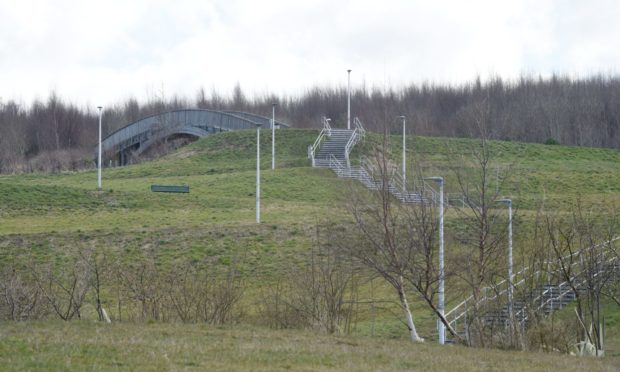With their high-vis jackets and branded baseball caps, these two officers are the opposite of undercover policing.
Their role is to be seen, to chat with people, understand their concerns and tackle local issues before they escalate.
A community beat team now operates across a large area stretching throughout Inverness, south to Tomatin and east to Ardersier.
In a throwback to the era of the beat bobby, they are out and about on foot or bike, aiming to provide a reassuring presence and engaging with people of all ages in schools, churches, community groups and on the streets.
Increased patrols following recent incidents
With pandemic restrictions still limiting indoor gatherings, a series of street surgeries has started to address policing issues affecting neighbourhoods.
The latest were held in Inshes Park, Milton of Leys and Raigmore where concerns about anti-social behaviour have been raised.
Increased patrols have been introduced in recent weeks after emergency services were called several times following reports of fires being started at Inshes Retail Park and nearby park.
A number of youths have since been charged.
Other issues have included vandalism at Inshes and Milton of Leys schools, as well as at Inshes Park, complaints of large gatherings of youths, vehicles speeding near the park and disturbances from loud car exhausts.
One local householder raised the issue of groups gathering in Inshes Park: “It’s intimidating to walk past them and people can’t get access to the park”, she said.
PCs Jo Barclay and Laura Kerr took part in the street surgeries as part of the community beat team duties.
“It’s about engaging with people, offering reassurance”, said PC Barclay. “Our whole job is to be as visible as possible.
“We work in the community, so we go to schools, meet with community councils and speak with councillors. But our main job is engaging with members of the public.
“Lots of people have concerns and issues. They won’t necessarily contact us because they think we’re so busy. But if we approach them and ask if we can help them they will chat.
“They want us to help. If we can do it ourselves, we do, or we can pass it on.
‘We are the bobbies on the beat’
“It’s old fashioned policing. People often ask ‘where are the bobbies on the beat? We are the bobbies on the beat.
“Because of Covid, police stations have been closed so we are holding these events outside. It’s to say ‘we’re here, come and speak to us about police matters and any concerns you have’. Generally, the response has been positive.
She added: “We try to be as proactive as possible. So, by working with councillors and partner agencies, we can try to resolve matters like anti-social behaviour.
“We are working quite a lot of with kids, in primary and secondary schools. That’s the next generation and they have had a rough time with Covid and it can make them feel confident and comfortable speaking to the police.
“They are a good source of information as well.”
The community officers can also become involved if colleagues responding to incidents believe a more local approach can help resolve an issue.
“They call us if they think a bit more engagement is needed. If it’s a community based issue, or if we know the people, it gets passed to ourselves”, said PC Kerr.
“People don’t always feel like their information is necessarily worth phoning 101. But they will feel more comfortable coming up to us in a more informal environment.”
Highland councillor Duncan Macpherson, whose ward includes Inshes Park and Milton of Leys, welcomed the community beat initiatives, including the street surgeries.
“It’s bringing old fashioned policing back to Inverness.
“They have been very good in responding to requests from councillors regarding incidents at Inshes Park.
‘It shows the human side of policing’
“It’s helping to break down any barriers. Police are there as a service for the public, it’s not ‘them and us’, they are there to protect everybody.
“It’s a great way to show the human side of policing.”
He added: “It’s been a tough year due to lockdown and it’s changed people’s behaviour. Youngsters need something to do as they are going stir crazy after being stuck at home for so long.
“But they also need better education on the do’s and don’ts and that will come through police and the fire service visiting. So I’m delighted this investment is being made.”


